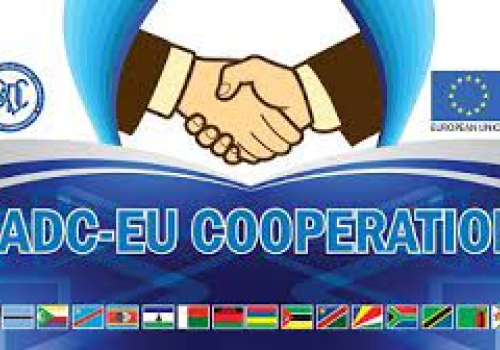The European Union (EU) is preparing new regional programmes that will benefit the Southern African Development Community (SADC) Region and help strengthen the EU-SADC partnership by bringing it to a new level, representative of the EU Delegation to SADC and the Republic of Botswana, Mr Jose Angel Marta Beccera, has said.
He was speaking at the official launch of the workshop on Intellectual Property Rights (IPRs) organised by the SADC Secretariat under the Support to the Industrialisation and Productive Sectors programme (SIPS) on 5th October 2022. SIPS is a €20 million programme established in 2019 to address major barriers to industrialisation in the SADC Region and in full support of the Regional Indicative Strategic Development Plan (RISDP). SIPS intends to improve local production as well as the growth and control of the regional leather and pharmaceutical value chains.
Mr Beccera said in the new Multiannual Indicative Programme 2021-2027 for Sub-Saharan Africa, the EU will focus its efforts on promoting enabling environments for further economic integration and trade. Under Priority Area 5 (Sustainable Growth and Decent Jobs), the Indicative Programme will support the harmonisation of trade related policies in order to strengthen Africa’s competition regime through the establishment of both modern competition rules at all levels and independent competition authorities.
“The EU will also support enhancing Africa’s investment framework, in particular in the area of investment facilitation and promotion. Finally, the EU will also target the promotion of IPR policies to ensure an adequate protection and effective enforcement of IPR, enhancing cooperation mechanisms between the African countries and strengthening the existing regional institutions,” he said.
Mr Beccera said the training on IPRs organised by SIPS, and the EU’s presence, were proof of the strong emphasis that the EU and SADC give to IPRs as a driver for sustainable and inclusive economic growth and competitiveness. As countries emerge from the COVID-19 pandemic, there are more than ever conscious of the importance that IPRs have to accelerate innovation in medicines and vaccines. Without a robust global IPR protection system, pharmaceutical companies would not have had the incentive to carry out the necessary investments on innovative medical products that have saved so many lives.
IPRs enable inventors, creators and businesses to prevent unauthorised exploitation of their creations, and to receive compensation for their investment. IPRs also offer guarantees to users or consumers to identify the origin of the goods concerned.
He said commercial-scale piracy and counterfeiting not only put at risk consumer safety and health, but can also harm the environment, and that when ideas, brands and products are pirated and counterfeited, jobs are affected. Rights holders therefore need access to effective ways of protecting their rights internationally.
He said the EU seeks to promote improving the protection and enforcement of IPRs in third countries. The EU conducts regular surveys on the enforcement of IPRs, to have an overview of the effectiveness of IPR regimes in countries outside the EU. The EU has adopted a revised Strategy for the Enforcement of Intellectual Property Rights in Third Countries, with specific measures to address IPR protection and enforcement problems affecting European businesses trading and investing abroad.
The EU-SADC Economic Partnership Agreements (EPA) can be qualified as a bilateral trade agreement between the EU and SADC EPA States, and includes provisions for cooperation on protection of IPRs (Article 16 of the EPA), but does not have an IPR Chapter proper.
The EU-SADC EPA, however, foresees that the parties may consider entering into negotiations on the protection of IPRs in future. In November 2021, EU and SADC EPA states launched a process to review the EPA, which could lead to expanding its scope to new areas. In this context, the issue of IPR might be looked at and the review process, Mr Beccera said, is at very early stages, with both sides still reflecting on possible areas for review.
The SIPS IPR training, was held in hybrid format with virtual and physical participants from SADC Member States namely Botswana, Eswatini, Lesotho, Malawi, Mauritius, Namibia, United Republic of Tanzania, Zambia and Zimbabwe, began on 5th October 2022 and ran until 15th October 2022. It was delivered in collaboration with Africa Regional Intellectual Property (ARIPO) at the ARIPO academy in Harare, Zimbabwe.

